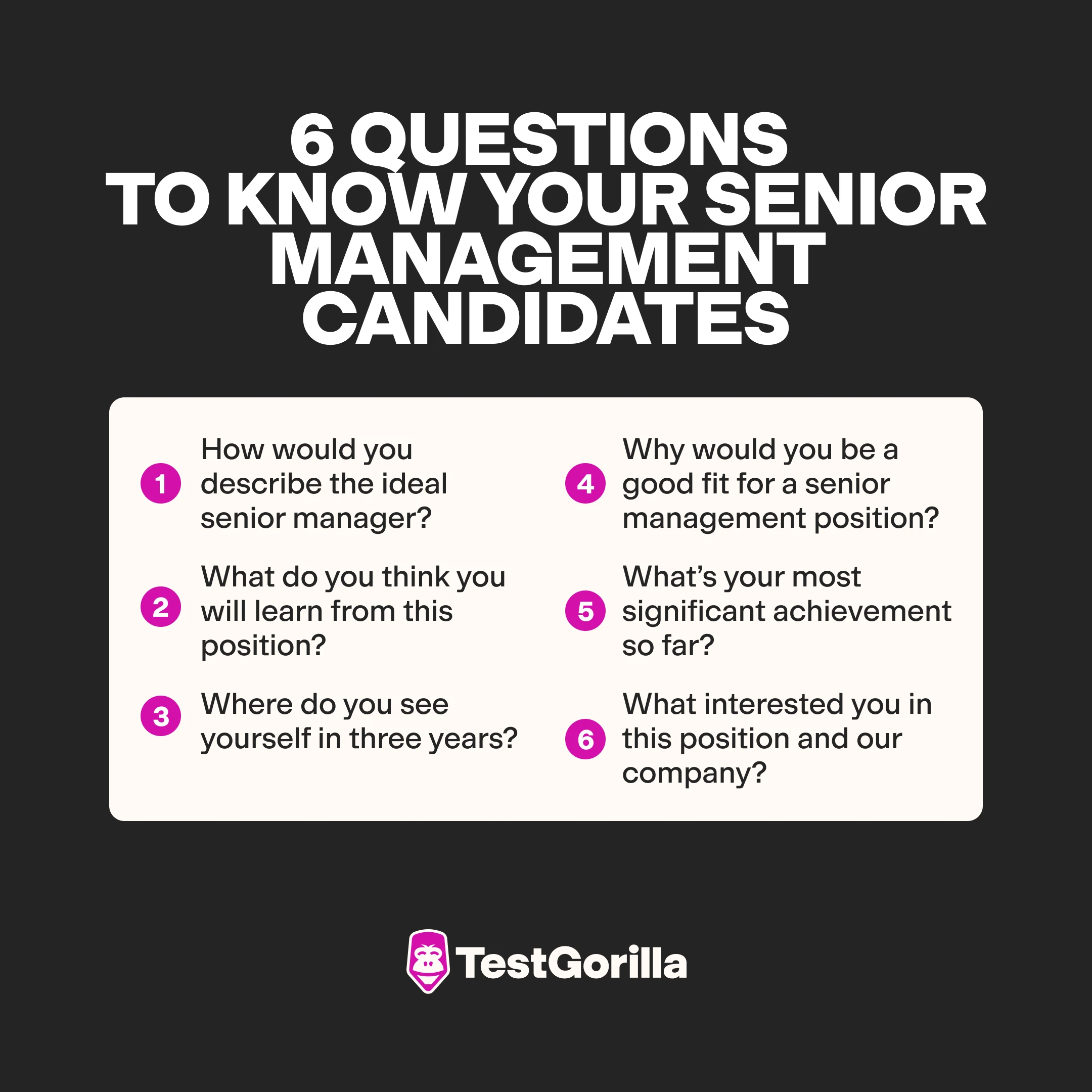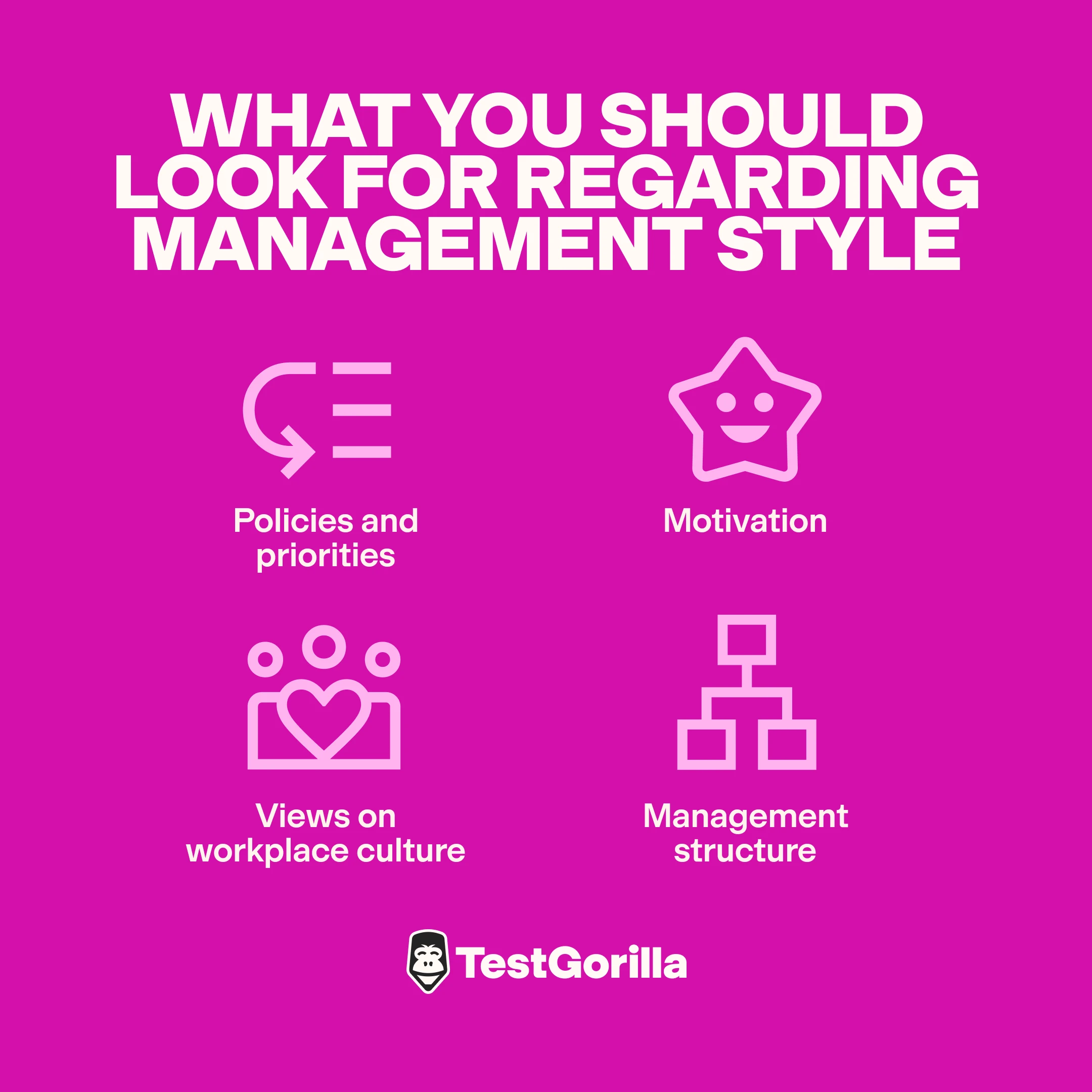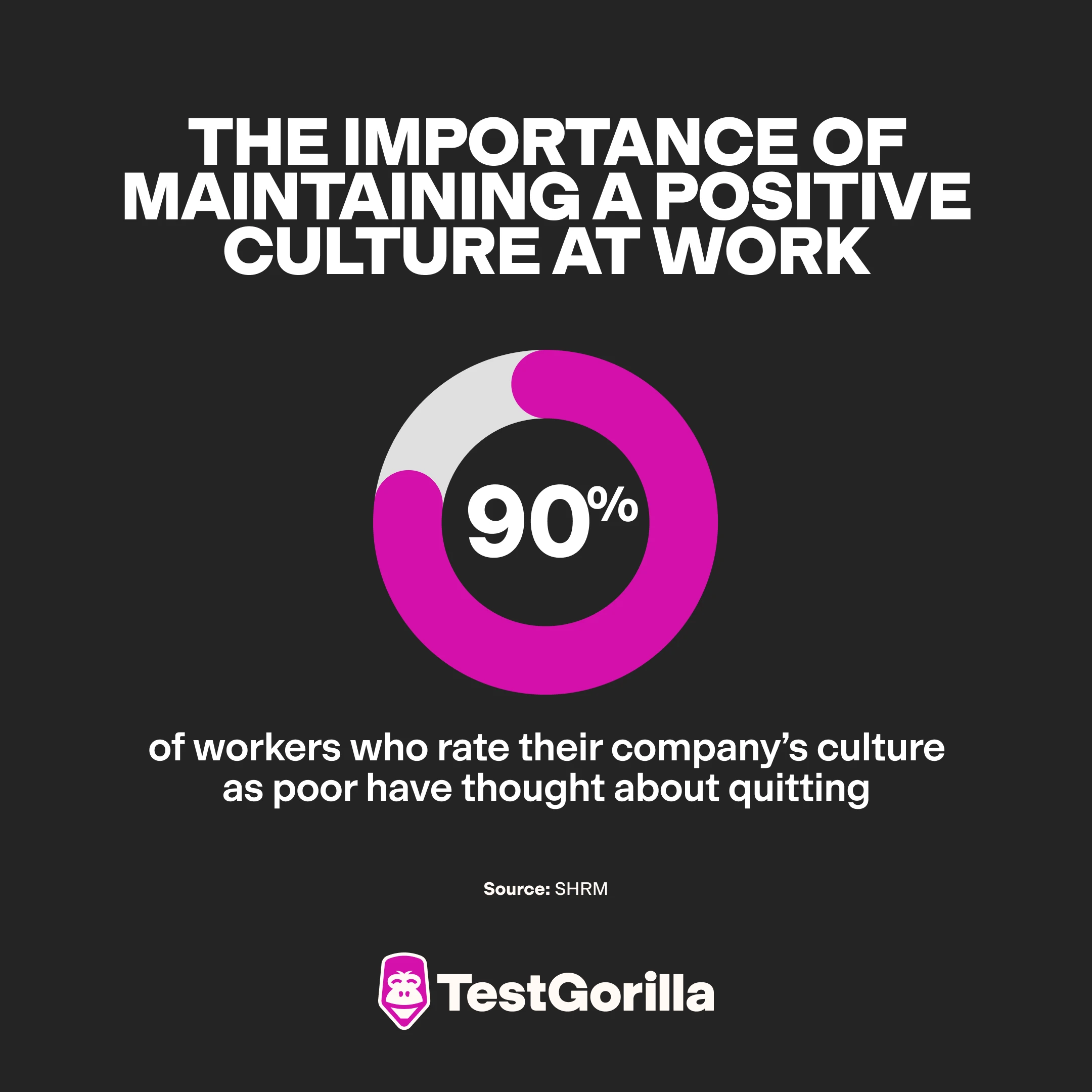27 senior management interview questions for your candidates
When hiring for a senior management position, your decision will impact all junior employees working underneath that person. So, you must be diligent to find the right candidate.
Before conducting interviews, you can narrow down your initial candidate pool using aptitude tests such as TestGorilla’s Leadership & People Management test. Then, asking the right questions during the interview will help you to identify the best picks for the position.
In this guide, you will find a list of 27 senior management interview questions for your candidates. Choose the most relevant questions to prepare for your interview and learn more about your interviewees.
Table of contents
- 6 questions to help you get to know your senior management candidates
- 11 questions about previous experience and professional accomplishments
- 7 questions about team leadership skills for your senior manager candidates
- 3 questions to learn about your candidate’s personality
- When should you ask these senior management interview questions?
- Which roles can you ask senior management questions for?
- Make your list of senior management interview questions to assess your candidates
6 questions to help you get to know your senior management candidates
Personality plays a vital role in leadership, and getting to know each of your candidates is essential. To understand your applicants and whether their personalities and values suit your company, consider giving them personality and culture tests.
You can ask some preliminary questions to learn more about your candidate’s traits and determine if they will integrate into the organization’s culture successfully.
Consider using softer questions and techniques like affective presence when you greet your candidate to ensure they feel comfortable around you. This approach will help them to warm up and communicate clearly.
1. How would you describe the ideal senior manager?
Asking an open-ended question about the candidate’s perception of the ideal senior manager will enable you to learn more about their aspirations.
If they believe the ideal senior manager is compassionate, disciplined, and supportive, you can expect the candidate to aspire to these qualities when joining your team. Top applicants will explain how they plan to develop these skills in their answers.
If your candidate doesn’t have leadership experience, this question will still show you their knowledge of leadership skills. Research and learning are important steps to becoming a great leader, so this question is an excellent starter for your interview.
2. What do you think you will learn from this position?
Your ideal candidate will have a clear vision for the future and ambitions that extend beyond a senior management position. By asking this question, you can understand whether your candidate wants to improve their skills and continuously develop in the position.
Their answer will reveal their passion and excitement for the role and what they are most excited to learn and experience as a senior manager. Look for candidates who explain how the lessons they learn from this role will propel them toward their career goals and help your business achieve its development objectives.
3. Where do you see yourself in three years?
Like the above question, asking your candidate this will help you to determine your candidate’s long-term goals for career progression. You should look for candidates who wish to progress within your company since they will contribute more value to your organization over time.
Ideally, applicants will state their intent to progress without indicating a desire to move from the organization within only a few years.
4. Why would you be a good fit for a senior management position?
When interviewing your candidates, you must question their self-belief and confidence. If your candidate does not have faith in themselves, they will be less prepared to take on a leadership position. So, ask why the candidate thinks they would be a good fit for the job.
This is the applicant’s opportunity to sell themselves and communicate their best qualities. If the candidate shies away from the question, this could indicate their lack of confidence in being a successful leader.
The best candidate will show that they’ve researched and understood the role. You can test their vital leadership abilities with TestGorilla’s Communication, Problem Solving, and Project Management tests.
5. What’s your most significant achievement so far?
Asking this question during your senior management interview will reveal the challenges and accomplishments that your candidate has conquered during their career. You might learn something interesting about your candidate that is unrelated to their previous experience in the field.
Your candidate could be a driven marathon runner or musician. Whether their most significant achievement is related to work, your ideal candidate should reference their self-discipline, motivation, and desire to achieve in their answer.
6. What interested you in this position and our company?
It’s crucial that your candidate has a genuine interest in leadership and the work you do at your business. The ideal candidate will have prepared for the interview by researching your organization in detail.
They should know your company values, work, and vision for the future. They will likely be a good fit for your opening if they explain why your organization suits their experience and personality.
11 questions about previous experience and professional accomplishments
Once you’ve gotten to know your candidate personally, you can ask about their career history. Their answers will paint a picture of their professional background and unique experiences thus far and how they might contribute to the position.
1. What education and training do you have relating to this position?
It’s important to discover any training and education your candidate has that could help them with the role.
The candidate could have a unique educational background that equipped them with an additional skill set. For instance, they could have teaching experience or an interest in psychology that gives them a helping hand in raising morale and supporting a team of employees.
Your candidate should explain in depth why they consider their experience beneficial and the lessons they learned, including how this makes them a more effective senior management candidate.
2. Tell us about your career thus far.
Asking this question will enable you to spot any red flags that could indicate your candidate isn’t the best fit for your business. For instance, if your interviewee is young but has moved between jobs and companies often, this could indicate their disinterest in company loyalty or simply their inability to hold a job long-term.
Keep a watchful eye for green flags as well. These could include a history of working with organizations for longer periods, a wealth of leadership experience, and progression within companies the candidate has worked for.
3. Have you taken any voluntary training to progress your career?
Ambition makes a candidate an excellent fit for a senior management position. Look for a candidate who has taken it upon themselves to learn, develop skills, and progress in their career. This indicates their self-motivation – a critical skill for a senior manager.
4. Tell us about a time you overcame challenges in your career.
How your candidate approaches a challenge will affect their resilience as a leader. You should look for a candidate with a solutions-focused approach to challenges in their career.
For instance, the candidate might state that they found difficulty accessing a certain career path and expanded their skill set or went for a slightly different position to overcome this challenge.
Pay attention to the method they used to overcome this difficulty and prioritize candidates who explain how and why their strategy to overcome personal or professional challenges was successful.
5. Have you ever had a conflict with a peer? Tell us how you dealt with the situation.
Managers spend more than four hours a week dealing with conflict. Whether it’s with a client, a peer, or one of their team members, they will have to overcome conflict while still maintaining a positive relationship.
Listen carefully to your candidate’s response to determine whether they successfully overcame the conflict and managed to maintain a positive working relationship with their peer after they reached an agreement.
6. How do you respond to criticism?
A senior manager will need the inner resources to overcome criticism without affecting their confidence. The candidate’s answer to this question will show you whether their response to critical feedback is constructive and productive.
Their answer should indicate their capacity to reflect on their behavior, work, and results to see if they have made a mistake and determine the necessary steps to rectify errors or misjudgments.
7. Do you have any leadership experience?
It’s hard to understand whether you’ll be a good leader until you’re thrust into a position of authority. If your candidate has prior experience leading a team, they will know their management style and have the confidence to integrate into your business right away. Here are some examples of what you should look for regarding management style:
Policies and priorities
Views on workplace culture
Motivation
Management structure
The right candidate’s management style will fit into your pre-existing work culture.
8. What’s your approach to boosting employee satisfaction and well-being? Give examples of your experience in this area.
Only 49% of workers in the US report being very satisfied with their work. That’s why many businesses seek senior managers who improve their employees’ well-being and job satisfaction.
This question helps pinpoint whether your senior manager candidate will emphasize well-being and if they have any existing knowledge or skills to help boost their team’s morale. Look for candidates who explain the importance of employee wellness and how it directly impacts productivity.
9. Why do you want to leave your current position?
Asking why the candidate wishes to leave their current position will help you understand what they seek from your role.
If they’re looking for more challenges or have simply gained all the skills they can from their current position, this indicates their desire for continuous development. However, if your candidate simply wishes for a better job title, this could reveal a tendency or intent for job-hopping, which you may wish to avoid.
10. What’s the most valuable lesson you’ve learned during your career?
You’ll find this question helpful if you’re looking for a candidate to open up and describe their working philosophy. This question will give your candidate the opportunity to tell you a story and explain how their experiences have shaped them into who they are today.
The ideal candidate will be able to relate their lesson to their career development and explain how this makes them a better senior manager.
11. How would your current team describe your leadership style?
If your candidate has previous leadership experience, this question can help you understand their personality as a leader, along with their leadership style.
Of course, if they know what’s best for them, your candidate will leave out any negative traits, but understanding their positive leadership traits can be useful.
The candidate’s response will help you analyze whether they will struggle or succeed in integrating with your existing company culture, so take note of answers that align with your current management style.
The best insights on HR and recruitment, delivered to your inbox.
Biweekly updates. No spam. Unsubscribe any time.
7 questions about team leadership skills for your senior manager candidates
You need to know whether your candidate can think on their feet. Below are some situational questions to help you understand whether your candidate can quickly develop an actionable plan. If you need to assess their situational judgment skills, consider using a Situational Judgment test from TestGorilla.
The keyword for these responses is actionable. Your candidate should provide a detailed answer that includes actionable steps or plans for dealing with each scenario.
1. How do you measure success when you finish a project?
An excellent senior manager knows precisely how to measure success once a project, task, or period is finished. They should be able to review and identify problem areas and places where their team has excelled.
Their answer should revolve around the company and the value they have generated for it – not for themselves. For instance, if their answer is about bonuses and rewards, then this does not reflect a desire to generate success for the business.
2. How would you handle an underperforming employee?
When you ask this question, you should look for a few different answers. Your candidate should be weighing up the following options:
Training the employee
Speaking with the employee
Firing the employee
They should give examples of when each method should be used and explain that whether they would fire the employee rests on whether they show the potential for improvement in the future.
3. How do you reward team members for exceptional work?
Rewards and praise are essential tools for leadership: According to one survey, 37% of employees responded that they would produce better work more often if they received more personal recognition. Your team leader should know how to reward their team with verbal praise and acknowledgment of their achievements.
They should list incentives they could offer the team to encourage hard work, such as letting them leave early on Fridays, giving them the opportunity to work from home, or taking them out for lunch.
4. What’s your method for selling ideas to your team?
Leadership isn’t tantamount to dictatorship. Senior managers should ensure their team is on board before proceeding with a plan. It’s a red flag if your candidate doesn’t understand the need to discuss ideas with their team and gain their approval.
5. How do you intend to create a positive workplace culture?
The importance of maintaining a positive culture at work can’t be understated: 90% of workers who rate their company’s culture as poor have thought about quitting.
This question gives your candidate a chance to share their knowledge of leadership strategies that improve company culture. They should outline a structured strategy for boosting employee morale, ensuring team members feel connected, and creating a culture that promotes engagement and well-being.
6. Do you assume leadership in any way outside of work?
If your candidate engages in leadership activities outside of work, whether as a parent or in a club, they can apply this experience. The more comfortable your candidate is with assuming authority, the better.
7. How do you delegate tasks?
A senior manager organizes a team and delegates and prioritizes tasks. Your candidate should be able to provide numerous examples of the factors that go into delegation decision-making, such as employee aptitude, time constraints, scheduling, and setting priorities.
3 questions to learn about your candidate’s personality
On the surface, these questions might not appear important. However, it’s important to understand whether your candidate has people skills and can hold fun conversations.
This is a critical element in creating strong bonds with other employees. Here are some questions to help you learn about your candidate’s personality traits, interests, and ability to socialize.
1. What’s your favorite film, and why?
This question is fun, unassuming, and a great way to get to know your candidate. Their answer will reflect their social skills and comfort level. Later, it will come in handy to help you remember each interviewee – especially if you have interviewed many people for the role.
They should have fun with their answer, and it should feel like a casual conversation rather than a forced response.
2. What do you like to do on the weekends?
Your candidate should be able to talk about their interests since this will encourage your employees to engage with them and build bonds. Paying attention to the length of their answer and how well they put it across will help you to decide whether they’re cut out to be your new senior manager.
3. If you could take anyone, alive or dead, out for dinner, who would it be?
Asking hypothetical questions is a great way to break the ice during an interview, and you can ask this question at the beginning or end of the interview to help your candidate relax.
When should you ask these senior management interview questions?
During the hiring process, you must take the proper steps to narrow down the list of applicants. Before the interview stage, you should give them aptitude and skills tests. You can then invite the top-performing candidates to an interview.
By implementing pre-employment testing before conducting interviews, you’ll better understand each candidate’s practical experience and aptitude before you even meet them in person.
The interview process then helps you get to know your candidate’s personality, ability to communicate, understanding of your business, and the role they’re applying for.
Which roles can you ask senior management questions for?
Most of these questions will come in handy if you’re hiring for any leadership or senior position within your organization. Here are some examples of the roles you might use these questions for:
Project management
Senior executive
Senior manager
Team leader
Looking to hire a business development manager? Use our free business development manager job description template to get started.
Make your list of senior management interview questions to assess your candidates
If you’re a hiring manager or recruiter looking to hire a senior manager, you should refine your interview process to save time and weed out unsuitable candidates.
Sign up for a free 30-minute demo with the TestGorilla team to learn how we can help you optimize your hiring process. Our professionals will review your current processes and develop the best recruitment plan with you.
Use the extensive resources in our skills test library to properly vet your candidates before inviting them to interview. Then use the interview questions listed above to get to know your potential senior managers.
You've scrolled this far
Why not try TestGorilla for free, and see what happens when you put skills first.


















